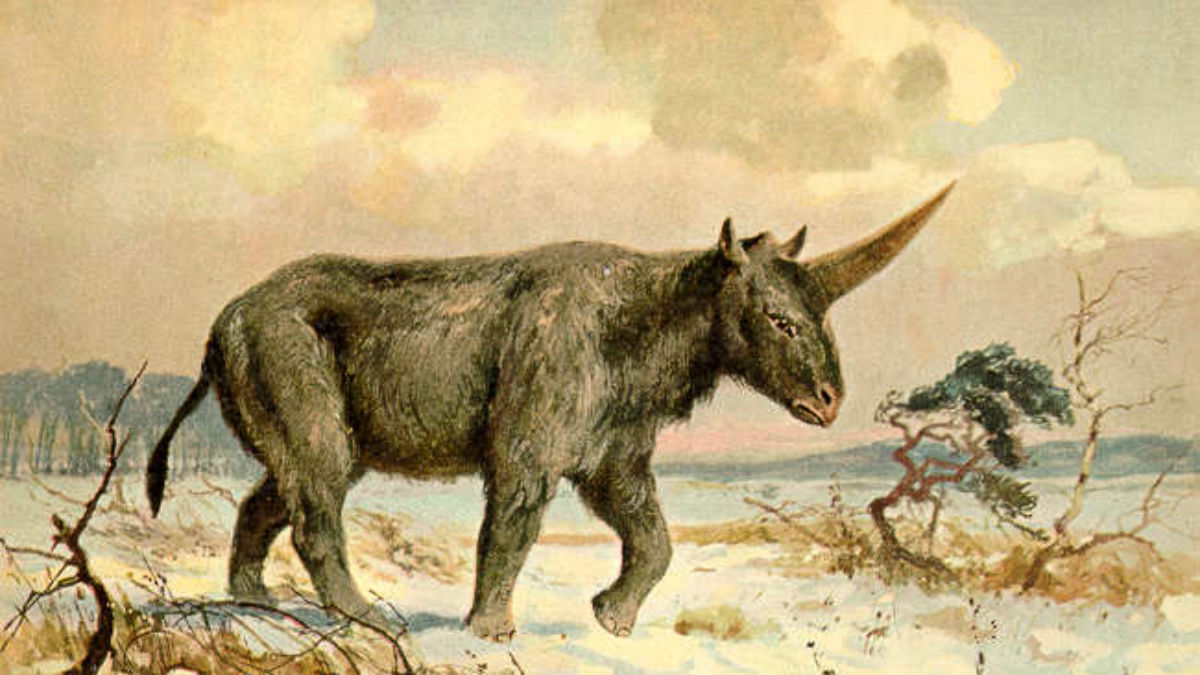'Siberian unicorn' may have lived alongside humans
Skull finding leads experts to believe mammal survived 300,000 years more than previously estimated

A free daily email with the biggest news stories of the day – and the best features from TheWeek.com
You are now subscribed
Your newsletter sign-up was successful
An extinct mammal nicknamed the "Siberian unicorn" is believed to have survived 300,000 years longer than previous evidence suggested, potentially changing scientists' perception of the prehistoric world.
Researchers analysed a well-preserved skull fragment from an Elasmotherium sibiricum recently discovered in Kazakhstan and dated it to around 29,000BC. Previous fragments indicated that the animal died out hundreds of thousands of years earlier.
The new research, published in the American Journal of Applied Science by a team at Tomsk State University in Russia, suggests it walked the Earth at the same time as modern humans. The oldest known homo sapiens remains have been dated to around 195,000BC, but behaviourally and cognitively "modern" humans are generally thought to have first appeared in 50,000BC.
The Week
Escape your echo chamber. Get the facts behind the news, plus analysis from multiple perspectives.

Sign up for The Week's Free Newsletters
From our morning news briefing to a weekly Good News Newsletter, get the best of The Week delivered directly to your inbox.
From our morning news briefing to a weekly Good News Newsletter, get the best of The Week delivered directly to your inbox.
Despite its nickname, the Elasmotherium sibiricum was more comparable to a rhino than a horse, with a shaggy coat and tough keratin horn. Although the "Siberian unicorn" might not have looked quite like the horned horse of legend, its stature was certainly of near-mythical proportions - scientists estimate it stood six-feet tall and weighed around 9,000lbs.
It's thought the skull fragment came from an outlier, perhaps one of a handful of the animals who managed to far outlive the rest of their species.
Palaeontologist Andrei Shpanski, the study's lead researcher, told Phys.org that the animal probably formed part of an enclave in the south of Western Siberia, which was somehow able to far outlast other members of the species, whose remains have been discovered in Eurasia. He is now encouraging mass carbon dating on remains of other mammals presumed to have gone extinct more than 50,000 years ago.
"Our research makes adjustments in the understanding of the environmental conditions in the geologic time in general," he said. "Understanding of the past allows us to make more accurate predictions about natural processes in the near future - it also concerns climate change."
A free daily email with the biggest news stories of the day – and the best features from TheWeek.com
-
 6 of the world’s most accessible destinations
6 of the world’s most accessible destinationsThe Week Recommends Experience all of Berlin, Singapore and Sydney
-
 How the FCC’s ‘equal time’ rule works
How the FCC’s ‘equal time’ rule worksIn the Spotlight The law is at the heart of the Colbert-CBS conflict
-
 What is the endgame in the DHS shutdown?
What is the endgame in the DHS shutdown?Today’s Big Question Democrats want to rein in ICE’s immigration crackdown
-
 Home Office worker accused of spiking mistress’s drink with abortion drug
Home Office worker accused of spiking mistress’s drink with abortion drugSpeed Read Darren Burke had failed to convince his girlfriend to terminate pregnancy
-
 In hock to Moscow: exploring Germany’s woeful energy policy
In hock to Moscow: exploring Germany’s woeful energy policySpeed Read Don’t expect Berlin to wean itself off Russian gas any time soon
-
 Were Covid restrictions dropped too soon?
Were Covid restrictions dropped too soon?Speed Read ‘Living with Covid’ is already proving problematic – just look at the travel chaos this week
-
 Inclusive Britain: a new strategy for tackling racism in the UK
Inclusive Britain: a new strategy for tackling racism in the UKSpeed Read Government has revealed action plan setting out 74 steps that ministers will take
-
 Sandy Hook families vs. Remington: a small victory over the gunmakers
Sandy Hook families vs. Remington: a small victory over the gunmakersSpeed Read Last week the families settled a lawsuit for $73m against the manufacturer
-
 Farmers vs. walkers: the battle over ‘Britain’s green and pleasant land’
Farmers vs. walkers: the battle over ‘Britain’s green and pleasant land’Speed Read Updated Countryside Code tells farmers: ‘be nice, say hello, share the space’
-
 Motherhood: why are we putting it off?
Motherhood: why are we putting it off?Speed Read Stats show around 50% of women in England and Wales now don’t have children by 30
-
 Anti-Semitism in America: a case of double standards?
Anti-Semitism in America: a case of double standards?Speed Read Officials were strikingly reluctant to link Texas synagogue attack to anti-Semitism